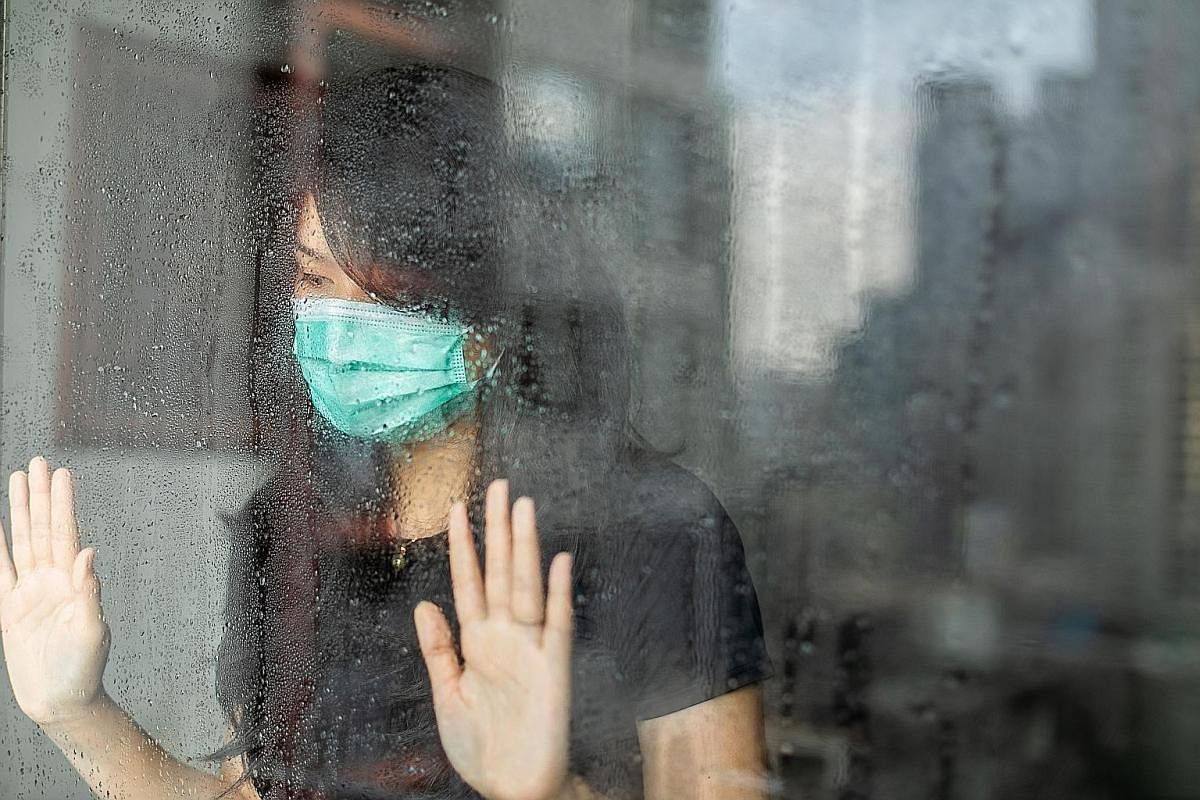-
HELPLINES
-
•Samaritans of Singapore: 1800-221-4444
•National Care hotline: 1800-202-6868
•Institute of Mental Health's Mental Health helpline: 6389-2222
•Silver Ribbon Singapore: 6385-3714
•Tinkle Friend: 1800-274-4788
•Agency for Integrated Care hotline: 1800-650-6060
•SOS Care Text service: It is available through Facebook Messenger on the SOS Facebook page
Help, the pandemic is driving me crazy
To cope with these uncertain times, mental-health experts advise people to focus on the present while looking to the future

During the two-month circuit breaker period from April 7, most people in Singapore stayed home as much as possible to fight Covid-19.
For Jane (not her real name), who does not have a good relationship with her parents, it meant being stuck with them every day.
The 19-year-old had difficulties with their intrusiveness.
"Having to be at home was difficult as she had no sense of personal space, both physical and psychological, " said Dr Cornelia Chee, head of the psychological medicine department at the National University of Singapore and National University Hospital.
Jane's case was among several Dr Chee cited to illustrate the pandemic's impact on mental health.
These people experienced heightened stress as Covid-19 disrupted lifestyles and livelihoods.
Experts warn that mental-health stresses can rise and problems can develop as the pandemic drags on.
Those who are more vulnerable include the low-income groups, said Dr Chee. Others include working mothers with young children, front-line and migrant workers, those with existing mental-health conditions and the elderly who are already socially isolated.
Dr Chee said there was a woman with dissociative identity disorder, which is characterised by a patient having multiple personalities.
When she needed help, she could not see her therapist in person. Video consultations were not possible as she felt there were too many people at home to give her the privacy she needed for the session.
While Singapore has recorded more than 54,000 Covid-19 infections, the mortality rate is below 0.1 per cent. But it is not known how many people's mental health have been impacted by the pandemic.
ANXIETY AND DEPRESSION
Dr Goh Kah Hong, head and senior consultant of psychological medi-cine at Khoo Teck Puat Hospital, said there are more people fighting anxiety or depression, as higher stress levels can result from the fear of contracting the illness or the consequences of the pandemic, such as job losses or financial hardship.
Susceptible people are falling ill more often, which is consistent with the diathesis-stress model of illness, he added.
According to the American Psychological Association, an illness can develop from a genetic or biological disposition for that illness (diathesis), combined with stressful conditions.
To address such issues in Singapore, a National Care hotline was set up in April. It has received more than 23,000 calls since then.
And last month, the Samaritans of Singapore (SOS) started an SOS Care Text service, bringing forward the launch from October.
The service, available around the clock from Mondays to Fridays except public holidays, has received about 300 text messages since then.
SOS chief executive Gasper Tan said the majority of clients are between 10 and 29 years old. Not all issues raised relate to the pandemic.
COPING MECHANISM
In the West, health experts are concerned about the reportedly increased consumption of alcohol and drugs to cope with the stress of the pandemic.
Dr Chee said: "Illicit drug abuse may actually go down due to less access from reduced travel and border traffic, but we may need to look for increased alcohol and prescription drug abuse."
To deal with the anxiety-provoking uncertainty of the pandemic, it helps to focus on the present while you look to the future, advise mental-health experts.
The Institute for Disaster Mental Health at the State University of New York at New Paltz said in an advisory people should find things they enjoy and appreciate every day, rather than waiting for happiness at the end of the pandemic.
Dr Goh stressed that people should seek help now if they need it, instead of waiting. "Help can come in many forms, starting with talking to loved ones about your struggle and anchoring yourself with self-care measures.
"Looking at the second and third waves of infection happening elsewhere, there is a possibility we are in the eye of a storm that is yet to blow over. At this stage, it is important to take stock and stay vigilant."
As the situation can change, people need to be flexible and respond to changes, he added.
Another useful tip is to take things one step at a time.
The Mental Health America's advice for coping with disaster: "For people under stress, an ordinary workload can sometimes seem unbearable. Pick one urgent task and work on it. Once you accomplish that task, choose the next one.
"Checking off tasks will give you a sense of accomplishment and make things feel less overwhelming."
People can also do something positive such as donating blood or helping others, which can give them a sense of purpose in a situation that feels out of control, it said.
SOS' Mr Tan said: "Being mindful of one's mental state allows us to check in with ourselves regularly during this difficult period and to seek support early before our emotions become destabilising and overwhelming.
"Loved ones should check in regularly with those around them and show genuine concern without judgment. The effects of the pandemic may affect different groups of people disproportionally."
On when to seek help, Dr Chee said: "If you are having significant anxiety or distress for at least two weeks, if it is consistently affecting your sleep, and especially if you start feeling a sense of hopelessness and helplessness, it's time to seek help."
Join ST's WhatsApp Channel and get the latest news and must-reads.
A version of this article appeared in the print edition of The Straits Times on August 10, 2020, with the headline Help, the pandemic is driving me crazy. Subscribe











